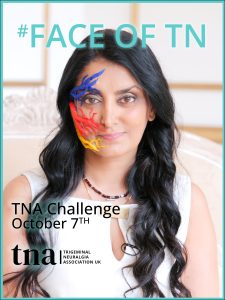Raising Awareness Through Innovation: National Trigeminal Neuralgia Awareness Day and Aneeta Prem’s Ground-breaking Campaigns
Few chronic pain conditions are as devastating, yet as poorly understood, as Trigeminal Neuralgia (TN). Often called “the suicide disease” due to its severe and relentless nature, TN affects the trigeminal nerve, which carries sensations from the face to the brain. With National Trigeminal Neuralgia Awareness Day approaching on 7th October, it’s essential to highlight the condition and the pioneering campaigns led by Aneeta Prem MBE, CEO of TNA UK and a TN sufferer herself.
The Face of TN: More Than Just a Hashtag

Aneeta Prem’s first campaign, “#FaceOfTN”, is a visually impactful initiative which raises awareness of this often invisible condition. Participants draw a representation of the branching trigeminal nerve on their face (avoiding the painful side) and share it on social media with the hashtag #FaceOfTN. This simple yet effective act serves several important purposes:
• Visibility: It brings TN to the forefront, breaking the silence around the condition.
• Education: The visual representation helps people understand the anatomy involved in TN.
• Community: It fosters a sense of solidarity among sufferers, showing they are not alone.
• Medical Awareness: It raises awareness among healthcare professionals who may have limited knowledge of TN.
Participants are also encouraged to wear teal, the official colour of TNA UK, which enhances the campaign’s visual impact and sense of unity.
Watch the #FaceofTN video
ShowTN3Fingers: A Revolutionary Awareness Tool

Following the success of #FaceOfTN, Aneeta Prem introduced the innovative #ShowTN3Fingers campaign, which combines solidarity and education. Participants hold up three fingers, representing the three branches of the trigeminal nerve:
• V1 (Index finger): Represents the ophthalmic branch, affecting the forehead and eye area.
• V2 (Middle finger): Symbolises the maxillary branch, affecting the cheek and nose.
• V3 (Ring finger): Denotes the mandibular branch, affecting the jaw and lower face.
This gesture holds significant meaning:
• Non-verbal Communication: For sufferers experiencing intense pain, the gesture allows them to communicate their condition without speaking.
• Public Education: It offers a simple way to explain the areas affected by TN.
• Medical Shorthand: Healthcare professionals can use the gesture to quickly discuss the affected areas with patients.
• Social Media Impact: Its simplicity makes it easy to share, amplifying the campaign’s global reach.
The Importance of These Campaigns for National Trigeminal Neuralgia Awareness Day
As we approach 7th October, these campaigns take on heightened importance. They provide a unified platform for raising awareness of a condition that is frequently misunderstood or misdiagnosed. Here’s why these initiatives are crucial:
• Breaking the Silence: TN is widely considered “one of the most painful conditions in medicine”, yet many sufferers remain voiceless. These campaigns give them a platform and a community.
• Educational Outreach: These initiatives serve as vital tools for educating the public and medical professionals about TN.
• Fundraising: As awareness grows, so does the potential for increased donations, which are essential for supporting helplines, research, and outreach.
• Policy Impact: Increased awareness can influence policy changes, such as greater research funding and improved access to treatment.
• Global Reach: The simplicity and visual appeal of these campaigns transcend language barriers, making them globally accessible.
Challenges and Opportunities
Despite the success of these campaigns, challenges remain. Many healthcare professionals are still unfamiliar with TN, resulting in frequent misdiagnoses and delayed treatments. Moreover, research into more effective treatments and potential cures remains underfunded compared to other neurological conditions.
However, the innovative work of Aneeta Prem and TNA UK continues to offer hope. By leveraging social media and powerful, simple gestures, they are sparking a global conversation about TN. As awareness increases, so does the potential for more timely diagnoses, better treatment options, and, ultimately, a cure.
This National Trigeminal Neuralgia Awareness Day, whether you are a sufferer, a healthcare professional, or an advocate, consider participating in these campaigns. Hold up three fingers, draw the trigeminal nerve on your face, wear teal, or share information about TN. By doing so, you’ll be part of a global movement bringing light to one of medicine’s most painful conditions.
For more information or to donate, visit the TNA UK website or text TNA05 to 70470 to donate £5. Even small actions can make a significant difference in the lives of those affected by this often “invisible” yet profoundly impactful condition.





